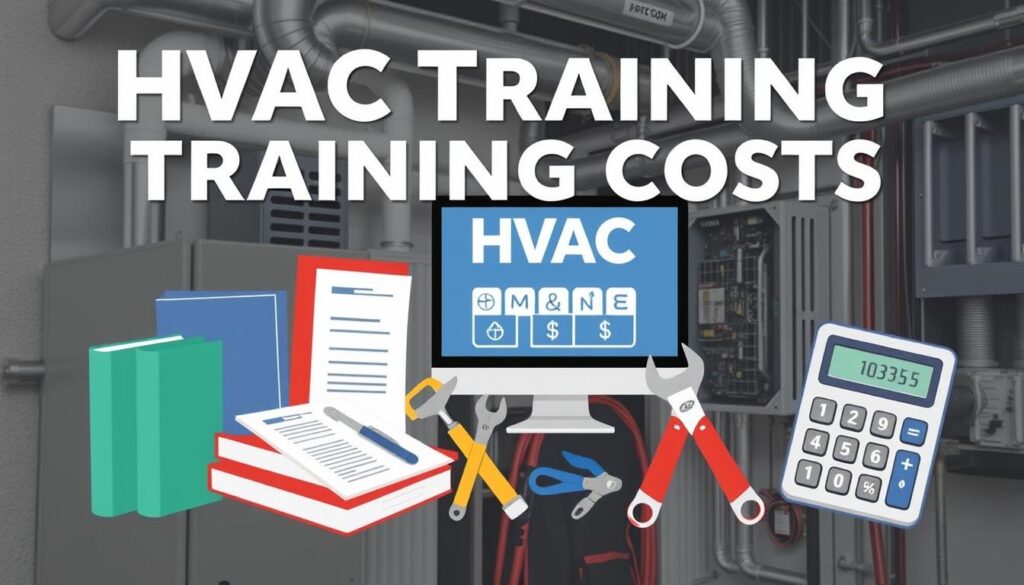Affiliate Disclosure
HVAC Guide Guys is a participant in the Amazon Services LLC Associates Program, an affiliate advertising program designed to provide a means for sites to earn advertising fees by advertising and linking to Amazon.
Can You Get HVAC License Online? Did you know the HVAC industry is growing fast? It’s expected to see a 5% job increase in the next decade. With 394,100 jobs available, the need for skilled HVAC technicians is high. These professionals make an average of $48,630 a year, making it a great career choice.
If you want to join this booming field, getting your HVAC license online is a smart move. HVAC technicians install, maintain, and fix cooling, heating, and refrigeration systems. To do this job, you need formal training and certifications like the EPA Section 608 for refrigerants.

Key Takeaways
- The HVAC industry is experiencing a 5% job growth projection, with 394,100 positions available.
- HVAC technicians earn an average salary of $48,630 per year, or $23.38 per hour.
- Online HVAC training programs offer flexible and convenient options for earning your HVAC license.
- EPA Section 608 certification is required to work with refrigerants.
- Various accredited institutions provide online HVAC training and certification programs.
Table of Contents
Understanding HVAC Career Paths and Licensing Requirements
Starting a career in HVAC offers many chances for skilled workers. It’s key to know the different HVAC licenses and the rules that vary by state.
Types of HVAC Licenses Available
HVAC certifications come after finishing a course and passing an exam. Groups like ESCO Group and NATE give these certifications. Many states need certain certifications with an HVAC license.
State-Specific Requirements and Regulations
Licensing rules for HVAC change by state. Knowing your local rules is crucial. Most states require a license to work with dangerous materials like refrigerants. The license test checks electrical knowledge and hands-on skills.
Educational Prerequisites for Licensing
To start in HVAC, you need a high school diploma or GED and HVAC courses. Getting practical experience is vital. You can get this through apprenticeships or co-op programs. The licensing exam has multiple-choice questions and hands-on tests.
| HVAC Licensing Steps | Description |
|---|---|
| 1. Educational Requirements | High school diploma or GED, and completion of an accredited HVAC program |
| 2. Practical Experience | Hands-on training through apprenticeships or co-op programs |
| 3. Exam Preparation | Studying for the licensing exam, which covers electrical knowledge and practical skills |
| 4. License Application | Submitting the required documents and fees to the state licensing board |
| 5. Licensing Exam | Passing the state-administered licensing examination |
Knowing about HVAC careers, licenses, and education helps you start a fulfilling job in this exciting field.
Explore Our HVAC Shop
Looking for top-rated HVAC tools, parts, and accessories? Visit our shop and find the perfect solution for your needs.
Visit the ShopCan You Get HVAC License Online: A Comprehensive Guide
The HVAC industry offers many career paths. Getting an online HVAC license is a flexible way to get certified. You can learn HVAC concepts online, but hands-on training is key to mastering the skills.
Online HVAC certification programs from accredited schools are helpful. They offer structured courses and recognized credentials. But, remember, these programs can’t replace the need for hands-on experience and state licenses to work as a pro HVAC technician.
SkillCat is a great online learning platform. It offers free HVAC training and certification courses. These courses cover HVAC topics like system components, troubleshooting, safety, and industry standards.
- Learn about HVAC systems and components through online lessons and tutorials.
- Get industry-recognized certifications like the EPA 608 and HVAC Excellence to boost your skills.
- Combine online learning with hands-on training to get the skills needed for a successful HVAC career.
While learning HVAC online is possible, make sure you meet your state’s licensing needs. By mixing online training with hands-on experience and state licenses, you can have a rewarding HVAC career.
Online HVAC Training Programs and Certification Options
Starting an HVAC career means getting certain certifications. Now, you can get these online. These programs teach you about EPA 608, NATE, and HVAC Excellence. They give you the skills to do well in the field.
EPA Section 608 Certification Process
The EPA 608 certification is key for HVAC techs. It shows you know how to work with refrigerants. You can get it online in about a month for around $10.
NATE and HVAC Excellence Certifications
Employers also look for NATE and HVAC Excellence certifications. These show you’re really good at your job. They can help you get ahead in your career.
Course Duration and Completion Requirements
Online HVAC training lasts from 6 months to 2 years. It depends on the course and how fast you learn. You’ll learn about HVAC and HVACR, getting ready for a career.
The U.S. Career Institute has online HVAC training. You can finish it in 6 months. It’s a flexible way to start your HVAC career.
Explore Our HVAC Shop
Looking for top-rated HVAC tools, parts, and accessories? Visit our shop and find the perfect solution for your needs.
Visit the ShopBenefits of Pursuing HVAC Training Online
In today’s world, getting an HVAC license online has many benefits. You can learn at your own pace, fitting your studies around your life. Online training is also cheaper than going to classes.
The HVACR Technician program at the U.S. Career Institute is just $1239 if you pay upfront. They also offer payment plans. This makes online training a great choice for those on a budget.
Online HVAC programs give you access to digital tools and practice tests. These help you learn the skills you need for the HVAC industry. You can do it all from home.
“The flexibility of online learning allows me to study at my own pace and fit my HVAC training around my busy schedule. It’s been a game-changer for me.”
The HVACR industry is growing fast, with more jobs coming. By 2033, there will be a 5% increase in jobs, says the U.S. Bureau of Labor Statistics. Online education makes it easier and cheaper to get into this field.
| Benefit | Description |
|---|---|
| Flexible Learning | Study at your own pace and schedule, balancing work, family, and other commitments. |
| Cost-effective Education | Online HVAC training programs are often more affordable than traditional classroom-based programs. |
| Digital Learning Resources | Access to interactive digital platforms, virtual simulations, and practice tests for a comprehensive HVAC education. |
Essential Skills and Knowledge Covered in Online HVAC Programs
Online HVAC programs do more than teach technical skills. They give students a complete education for success in the field. Students learn about HVAC system parts, safety rules, and more.
Technical Components and Systems Understanding
Online HVAC courses dive deep into HVAC systems. They cover the refrigeration cycle, airflow, hydronic systems, and gauge usage. Students learn to read charts and understand HVAC installation, service, and maintenance.
Safety Protocols and Industry Standards
Safety is key in the HVAC field. Online programs stress the need for safety rules. This includes using the right PPE, keeping job sites safe, and getting the right certifications, like EPA Section 608.
Troubleshooting and Maintenance Skills
Being able to fix problems and keep systems running is crucial. Online programs teach students to find and fix common issues. They also learn how to do routine maintenance and prevent problems.
By finishing an online HVAC program, students get a wide range of HVAC technical skills, industry standards knowledge, and troubleshooting skills. This prepares them for success in the HVAC industry.
“The online HVAC program gave me a strong base in HVAC system parts and fixing techniques. I’m ready to face real HVAC challenges and offer reliable service to my customers.”
Explore Our HVAC Shop
Looking for top-rated HVAC tools, parts, and accessories? Visit our shop and find the perfect solution for your needs.
Visit the ShopCareer Opportunities and Salary Expectations
The outlook for HVAC careers is very promising. The Bureau of Labor Statistics says HVACR technician jobs will grow by 13% in the next few years. This will create 46,300 new jobs, which is much faster than the average for all jobs.
HVACR technicians make an average of just under $49,000 a year. The highest earners can make up to $78,000. Jobs like project managers, engineers, and specialized technicians in complex commercial systems pay the most. As you gain experience and get more certifications, your salary can go up a lot.
| HVAC Job Title | Average Salary |
|---|---|
| HVAC Technician | $48,730 |
| HVAC Project Manager | $77,890 |
| HVAC Engineer | $87,370 |
| Specialized HVACR Technician | $63,210 |
In summary, the HVAC job outlook and HVAC technician salary are very good. There are lots of chances for career growth in this field. With the right training and certifications, you can do well in this exciting and rewarding industry.

Tools and Resources for Online HVAC Students
Starting an HVAC career online opens a world of digital tools. You get everything from interactive simulations to practice exams. These resources help you succeed in your studies.
Digital Learning Platforms and Materials
Online HVAC courses offer many digital study aids. You’ll find interactive presentations, animations, and videos. These help you see HVAC systems and parts, making complex concepts easier to understand.
Many programs give you 24/7 access to digital textbooks and manuals. This lets you learn at your own speed.
Virtual Simulations and Practice Exams
Online HVAC training includes virtual simulations and practice exams. These tools let you practice without risk. They help you improve your problem-solving skills.
With HVAC learning resources like online simulation tools and practice exams, you’re set. These tools help you master the skills needed to succeed in HVAC.
“The virtual simulations and practice tests were invaluable in helping me prepare for my HVAC licensing exam. I felt confident and ready when I walked into the testing center.”
– Sarah, Online HVAC Graduate
Explore Our HVAC Shop
Looking for top-rated HVAC tools, parts, and accessories? Visit our shop and find the perfect solution for your needs.
Visit the ShopCost Considerations and Financial Planning
Getting into an HVAC training program needs good financial planning. Costs can change based on the program and where you are. It’s key to plan your budget for all needed expenses.
Online HVAC training tuition can be from $1,000 to $5,000. Some programs have payment plans starting at $59 a month. You also need to think about the cost of certification exams, study materials, and tools. These can add hundreds of dollars to your total cost.
Look into financial aid to help cover the costs. Many programs offer scholarships, grants, or loans to make education easier to get. Some employers might also help with tuition or give financial support for HVAC certification.
| Expense | Estimated Cost |
|---|---|
| HVAC Training Program Tuition | $1,000 – $5,000 |
| Certification Exams (EPA Section 608, NATE, HVAC Excellence) | $100 – $500 |
| Study Materials and Tools | $200 – $500 |
| Contractor Licensing Fees (varies by state) | $150 – $2,000 |
By looking into financial aid and using payment plans, you can make HVAC training more affordable. Make sure to include all possible costs in your financial plan.

Conclusion
The HVAC industry is booming, and there’s a big need for skilled technicians. The Bureau of Labor Statistics says there will be 19,000 new jobs in the next decade. Online HVAC certification programs are a great way to get into this field, offering flexibility and cost savings.
Getting EPA certification is key for HVAC techs. It lets them work with refrigerants safely and legally. Also, getting NATE and HVAC Excellence certifications can boost your skills and job prospects. Keeping up with industry standards helps you succeed in the long run.
If you’re starting your career or want to switch to HVAC, there are many online training options. With the right program and hard work, you can find great opportunities in this growing field. Start your HVAC career today and see how online education can help.

